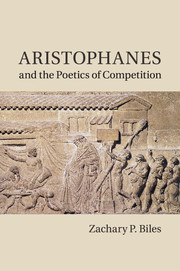Book contents
- Frontmatter
- Contents
- Acknowledgments
- List of abbreviations
- Introduction: proagon
- 1 From Thamyris to Aristophanes: the competitive poetics of the comic parabasis
- 2 The competitive partnership of Aristophanes and Dikaiopolis in Acharnians
- 3 Aristophanes' poetic tropaion: competitive didaskalia and contest records in Knights
- 4 Intertextual biography in the rivalry of Cratinus and Aristophanes
- 5 Aristophanes' Clouds-palinode
- 6 Dionysos and Dionysia in Frogs
- Bibliography
- General index
- Index of passages
3 - Aristophanes' poetic tropaion: competitive didaskalia and contest records in Knights
Published online by Cambridge University Press: 25 January 2011
- Frontmatter
- Contents
- Acknowledgments
- List of abbreviations
- Introduction: proagon
- 1 From Thamyris to Aristophanes: the competitive poetics of the comic parabasis
- 2 The competitive partnership of Aristophanes and Dikaiopolis in Acharnians
- 3 Aristophanes' poetic tropaion: competitive didaskalia and contest records in Knights
- 4 Intertextual biography in the rivalry of Cratinus and Aristophanes
- 5 Aristophanes' Clouds-palinode
- 6 Dionysos and Dionysia in Frogs
- Bibliography
- General index
- Index of passages
Summary
To later readers of Old Comedy, the Lenaia of 425, at which Acharnians was produced, must have seemed a remarkable occasion. Competing were the three poets who eventually became the undisputed triumvirate of fifth-century comedy: Cratinus, Eupolis, and Aristophanes (Ach. Hyp. I. 32–4). Cratinus, whose career was now most likely entering its fourth decade, was undoubtedly the preeminent comic poet of his generation, with eight of his nine career victories probably behind him at this point. His preeminent position would soon be claimed, however, by two younger rivals. Eupolis debuted in 429 and within a few years was victorious at the Lenaia, possibly in 426, the year before Acharnians was performed. Aristophanes produced his first play in 427 and almost certainly won his first contest one year later, at the City Dionysia in 426 with Babylonians. In short, the comic agon at the Lenaia of 425 brought together the finest talent of the period, and we can only imagine the mixed feelings of excitement and trepidation with which Aristophanes awaited the competition, and his sense of accomplishment when Acharnians was awarded the prize.
The importance of Aristophanes' victory with Acharnians for his identity as a competitive poet can be measured by an examination of Knights, the play with which he returned to the Lenaia in 424. In both a thematic and formal sense, Knights is the most agonistic of the surviving Aristophanic comedies.
- Type
- Chapter
- Information
- Aristophanes and the Poetics of Competition , pp. 97 - 133Publisher: Cambridge University PressPrint publication year: 2011
- 1
- Cited by

